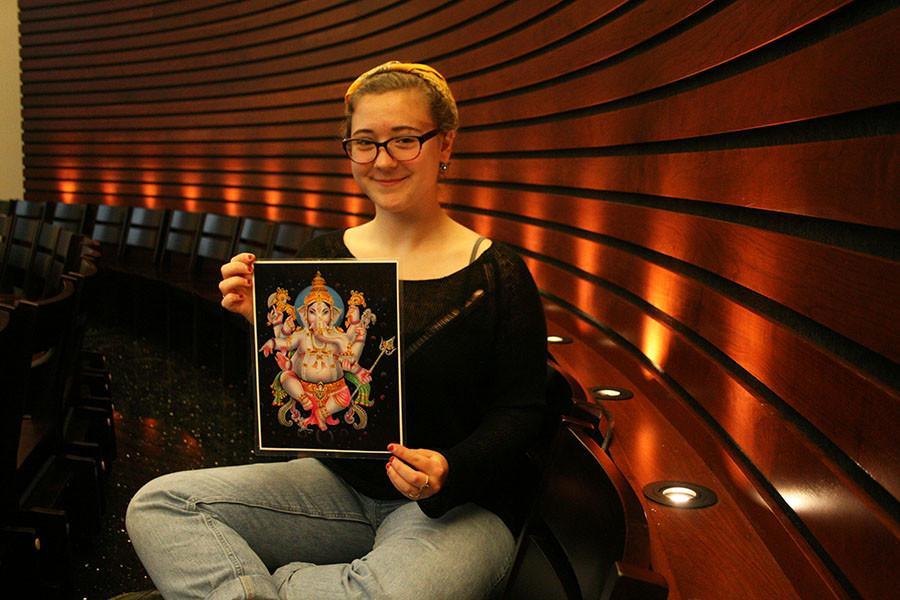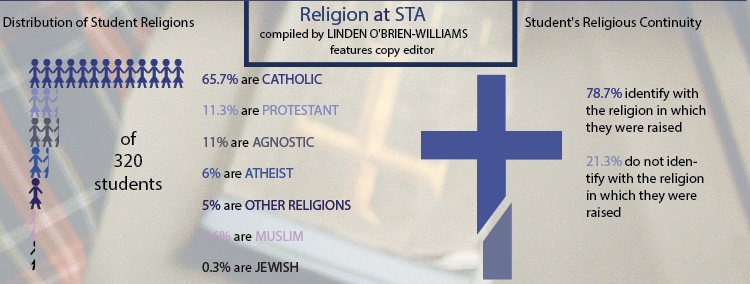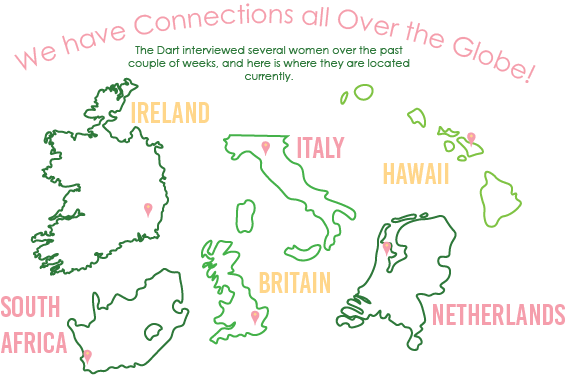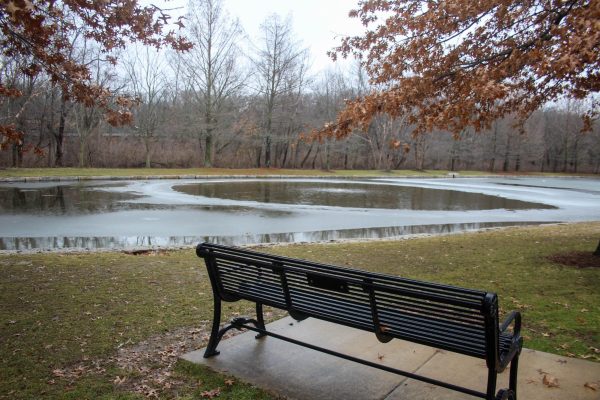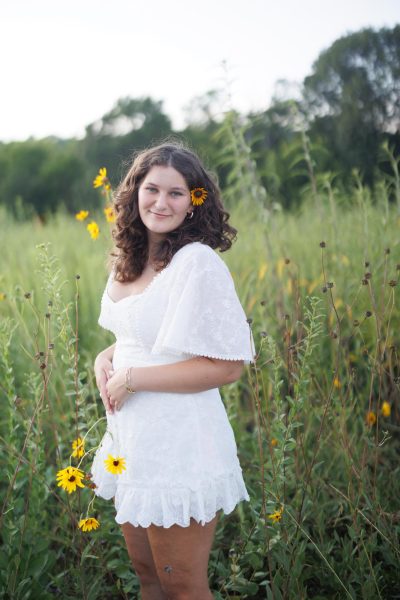Non-Catholics at STA
Non-Catholic students at STA share their experiences in a Catholic atmosphere.
Senior Amber Brownlee shows a picture of the Hindu god, Ganesh. Brownlee recalled growing up around pictures of Hindu gods and Hindu storybooks, but had never actually practed Hinduism. photo by Cassie Hayes
story by Gwyn Doran
Looking around, you see other teenage girls with their eyes fixed on the front of the room. They chant loudly in unison, never hesitating in their answers. At their leader’s instruction, they sit down, stand up, and respond to him. You feel like an outsider, never knowing what to say and awkwardly mimicking the actions of the others.
This is how freshman Margaux Renee felt at her first all-school mass.
Before attending STA, she had accompanied a friend to mass once, but the Catholicism remained foreign to her.
“When I first went, I didn’t know what was happening,” Renee said.
Even though she’s thrown by the unfamiliar setting, Renee is no stranger to religion.
“I’ve had a lot of exposure to Muslim culture because at my grade school, Academie Lafayette, there were a lot of teachers from Africa,” Renee said. “My aunt and uncle are Hindu. My mom was raised as a Jehovah’s Witness and teaches at a Jewish high school in Overland Park, so I know a lot about Judaism.”
Despite her diverse awareness of religion, Renee said she didn’t know anything about Christianity before attending STA. Still, Renee has learned to embrace her theology classes as an opportunity to broaden her already open-minded view of religion.
“I was terrified,” Renee said. “I was so confused. Now, theology is my favorite class because I’m learning brand new things.”
Theology teacher Jennifer Greene said she knows there are non-Catholic students in her classes, but she refrains from asking.
“I don’t want to point [non-Catholic students] out or make them feel uncomfortable,” Greene said.
However, Greene was doubtful this is the best method. She understands that non-Catholic students aren’t always aware of Catholic routines, leaving them feeling more lost during mass or theology classes.
“We start the year immediately with Catholic customs,” Greene said. “Some students may have no idea what “[St. Joseph] pray for us” is or what it means or why we even pray to the saints. We do need to be careful about that.”
Greene acknowledged that the theology department often discusses how to educate students like Renee, who have no Catholic background, such as proposing a Catholic 101 class for incoming freshmen.
“We could offer something where we could at least give those students the context so they can maneuver through Catholic school,” Greene said. “We tell them what we believe and how it looks.”
photos by Cassie Hayes
[nggallery id=1157]
However, students like Renee with no religious background are rare since most were raised Catholic or attended a Catholic grade school. Junior Sarah Ferron, while sharing her peers’ religious upbringing, identifies as an atheist.
“I never really believed in God,” Ferron said. “And [attending Saint Thomas More School] made me less religious. It was a very conservative and narrow view of religion, and a lot of people aren’t going to fit that narrow view of religion. They’ll feel like they’re not religious because they don’t agree with what they were brought up to believe.”
Ferron said the closed-minded atmosphere of her grade school led to a shock when she first experienced STA’s more tolerant environment.
“I think we do have a liberal education at STA, as far as religion goes,” Ferron said. “I’m sure some people at the school don’t like that. But most teenagers will probably want that more open-minded view of faith. I was a little bit surprised because I went to such a conservative grade school, so it was interesting to experience this new take on religion.”
Greene agreed that high school and grade school theology differ. Some grade schools adopt a lighthearted and straightforward view of religion, while others offer a more analytical approach. As a high school theology teacher, she receives students with a wide variety of religious education.
“Sometimes we assume there is good teaching of the faith going on, but that’s not always true,” Greene said. “You don’t know what you’re getting when kids come to class.”
Though Ferron does not identify with Catholic values, she acknowledges the benefits accompanying faith-oriented education.
“If I really was opposed to religion, I wouldn’t have attended STA,” Ferron said. “I think that religion is beautiful and should be celebrated. I’m able to learn from theology class without the religious aspect. I can take Social Concerns class as a platform to talk about injustices in the world. I’m not viewing it as something that’s specifically made for Catholics.”
Despite her greater insight into religion, Ferron’s atheistic views remain the same.
“The religious aspects of STA have not impacted me,” she said. “I’m here to learn and get a good education. I’m not here to convert…Religion just isn’t something that I have in my life.”
Sophomore Natalie Kistler, an active member of the Presbyterian Church, discussed how she approaches education rooted in Catholicism. When deciding which high school to attend, she considered three Catholic schools and the Pembroke Hill School. Though she wasn’t Catholic, she valued the principles of a religious foundation in her education.
“I liked the whole aspect of religion at school,” Kistler says. “I didn’t really care about it being Catholic. I just liked the idea of the school being faith-oriented.”
Kistler noted that she also saw a difference between how grade schools and high schools approach other religions.
“I found that STA is a lot more welcoming to non-Catholic people [than my grade school],” Kistler said. “I feel like STA doesn’t teach specifically Catholic faith, but just faith…You get different perspectives.”
Though Renee’s first time attending mass at STA might have felt awkward, she is far more comfortable with Catholicism now than at the beginning of the year.
“I think I’ve kept up pretty well…I picked it up and it’s pretty easy to understand,” Renee said. “I’ve started to memorize certain things. It’s nice because I don’t take Communion since I’m not Catholic, but I get blessed and it feels more welcoming.”
A few of Renee’s friends from her grade school belong to other Christian denominations and also feel unfamiliar with some Catholic customs.
“We’re all just going through it and being confused together,” Renee laughs.
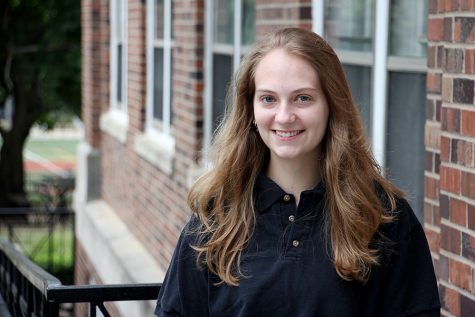
I’m Gwyn, the opinion editor for the Dart, and this is my second year on staff. When I’m not running cross country, you can probably find me watching...
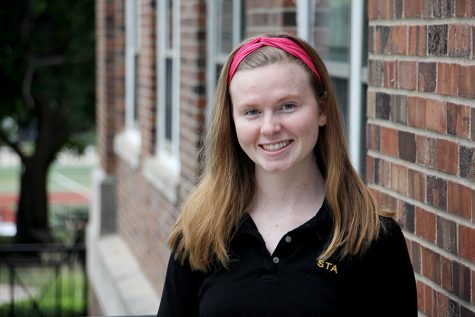
Hello there!
It seems you’ve stumbled upon the DNO staff profile of Linden O’Brien-Williams, co-editor-in-chief of the Dart and DartNewsOnline....
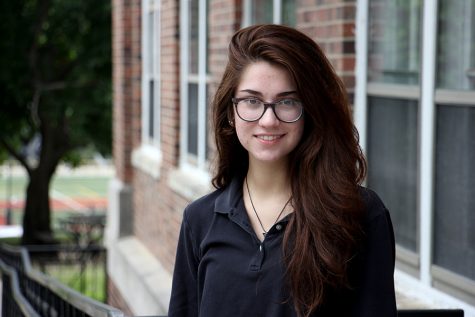
Hey there, I’m Cassie Hayes, a senior and a second year staffer for the Dart. This year I’ll be serving up some sick photowork as one of your photo...



